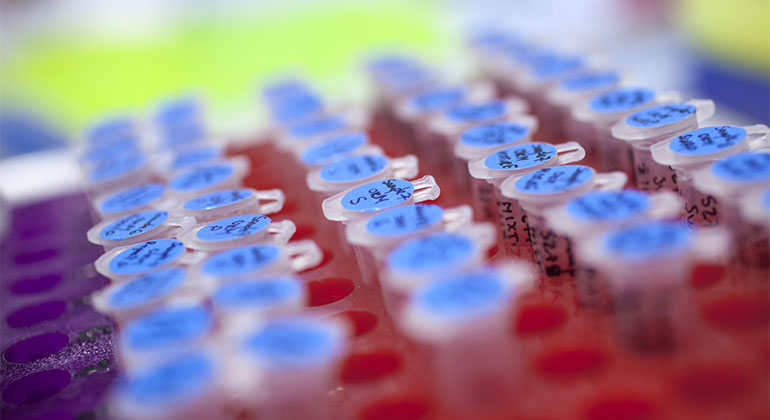Third Dose of COVID-19 Vaccine Significantly Increases Immune Responses in Most Patients With Multiple Myeloma
A subset of blood cancer patients still remained vulnerable, needing fourth dose or antibody treatments

Most immunocompromised people with a blood cancer called multiple myeloma benefited from a third dose of COVID-19 vaccines, a promising sign after it was shown that two doses tended to not be sufficient for them. However, some people with multiple myeloma still remained vulnerable and may need a fourth dose or antibody treatments as restrictions lift and new variants emerge, according to a fast-tracked study in Cancer Cell.
“This study is the first to comprehensively capture the immune effect of the third dose of the COVID-19 vaccine in patients with plasma cell disorders and blood cancers like multiple myeloma,” said one of the study’s lead authors, Samir Parekh, MD, Director of Translational Research in Multiple Myeloma at The Tisch Cancer Institute at Mount Sinai and Professor of Medicine (Hematology and Medical Oncology), and Oncological Sciences, at the Icahn School of Medicine at Mount Sinai. “It provides guidance to myeloma patients, who are at risk for severe infection because they may be immunocompromised due to the disease itself and the cancer treatment.”
Mount Sinai’s previous research had shown that breakthrough infections occurred in multiple myeloma patients due to poor or no response to the normal regimen of COVID-19 vaccines, the majority of which were the two-dose mRNA vaccines. These vulnerable patients’ lack of complete protection led to antibody testing and a third vaccine in hopes that this would increase the immune response. This study was important in understanding whether vulnerable patients were adequately protected by the third dose or needed to continue to follow strict social distancing and masking or seek additional vaccines or treatments when available.
In this latest study, blood samples were collected from 476 patients with plasma cell disorders over a period of 15 months and were compared to samples collected from healthy, vaccinated health care workers. The findings showed that the third dose significantly increased the level of antibodies in patients with and without prior COVID-19 infection but levels of COVID-19-fighting antibodies in multiple myeloma patients remained below those observed in healthy people.
Just more than a quarter of the multiple myeloma patients had no detectable antibodies after the standard two doses of the vaccine, but in these patients, 88 percent developed antibodies after a third dose. The third dose also resulted in a significant increase of other immune cells such as T cells and B cells, which also help neutralize COVID-19.
After the third dose, neutralization of the wild-type virus increased in multiple myeloma patients in patients who had minimal or no response to the standard two doses. However, neutralizing titers against the Omicron variant was still lower in myeloma patients as compared to healthy controls. Therefore, a subset of patients may still remain vulnerable to SARS-CoV-2 infection.
“Our findings underscore the need for continued monitoring of immune responses and further research around measures such as additional vaccine doses or passive immunization for individual multiple myeloma patients who may remain vulnerable after third-dose vaccination, especially as COVID-19 restrictions are being lifted worldwide and new waves of viral variants are emerging,” said the study’s other lead author, Viviana A. Simon, MD, PhD, Professor of Microbiology, Infectious Diseases, and Pathology, Molecular and Cell Based Medicine at the Icahn School of Medicine at Mount Sinai.
About the Mount Sinai Health System
Mount Sinai Health System is one of the largest academic medical systems in the New York metro area, with 48,000 employees working across seven hospitals, more than 400 outpatient practices, more than 600 research and clinical labs, a school of nursing, and a leading school of medicine and graduate education. Mount Sinai advances health for all people, everywhere, by taking on the most complex health care challenges of our time—discovering and applying new scientific learning and knowledge; developing safer, more effective treatments; educating the next generation of medical leaders and innovators; and supporting local communities by delivering high-quality care to all who need it.
Through the integration of its hospitals, labs, and schools, Mount Sinai offers comprehensive health care solutions from birth through geriatrics, leveraging innovative approaches such as artificial intelligence and informatics while keeping patients’ medical and emotional needs at the center of all treatment. The Health System includes approximately 9,000 primary and specialty care physicians and 10 free-standing joint-venture centers throughout the five boroughs of New York City, Westchester, Long Island, and Florida. Hospitals within the System are consistently ranked by Newsweek’s® “The World’s Best Smart Hospitals, Best in State Hospitals, World Best Hospitals and Best Specialty Hospitals” and by U.S. News & World Report's® “Best Hospitals” and “Best Children’s Hospitals.” The Mount Sinai Hospital is on the U.S. News & World Report® “Best Hospitals” Honor Roll for 2025-2026.
For more information, visit https://www.mountsinai.org or find Mount Sinai on Facebook, Instagram, LinkedIn, X, and YouTube.

Diabetes May Accelerate Blood Cancer Growth, Yet Survival Outcomes Differ by Race
Sep 29, 2023 View All Press Releases
Potentially Serious Side Effect Seen in Patient after Immunotherapy
Dec 10, 2021 View All Press Releases